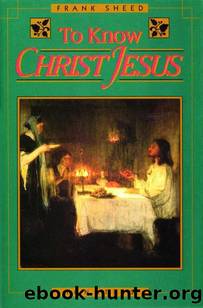To Know Christ Jesus by Sheed Frank

Author:Sheed, Frank [Sheed, Frank]
Language: eng
Format: epub
Tags: Spiritual & Religion
ISBN: 9780898704198
Publisher: Ignatius Press
Published: 2011-06-15T04:00:00+00:00
Five Newcomers
To complete the Twelve (Mk 3), Jesus chose five men whose names we are hearing for the first timeâsome of them almost for the last.
James and Jude are thought to have been his cousinsâwe know that he had four cousins named James, Joseph, Jude,âand Simon (Mk 6:3).
James, called the Less, because he was younger than the other James, was to become head of the Church in Jerusalem, and it fell to him to announce that Churchâs acceptance of Peterâs decision not to bind Gentile converts by Jewish ritual and ceremonial law (Acts 15:13-21). He wrote the Epistle which Luther called âan epistle of strawâ.
Jude is usually held to be that same Jude who wrote an Epistle. At the Last Supper he asked Jesus the question which brought the answer: âIf any one love me . . . my Father will love him and we will make our abode with himâ (Jn 14:23). There has been a recent surge of devotion to him as Help of the Hopeless.
Thomas is, apart from Peter and John, the most colorful personality among the apostles: his name is still used for people hard to convince, as Judas for traitors. The Jewish word Thomas means Twin, so does the Greek word Didymus. One wonders whose twin he was, that the fact of twinship should have given him his nameâanother of the Twelve, perhaps. But which? It was Thomasâ glory that at the Last Supper he asked the question which was answered with âI am the Way and the Truth and the Lifeâ (Jn 14:5-6). His glory, too, that he alone is recorded as having addressed our Lord as GodââMy Lord and my Godâ (Jn 20:28). As glorious was his reception of Jesusâ announcement that he would go to Bethany for the raising of Lazarus. They all knew that he was going to his death, for Bethany was only two miles from Jerusalem. Thomas said: âLet us go too and be killed along with himâ (Jn 11:16). It is curious that he, alone of the apostles, is eclipsed by a namesake: when today we say Saint Thomas, everyone assumes that we mean Aquinas.
Simon, subtitled the Zealot, is not thought to be the Simon named in the short list of the Lordâs cousins. Why the subtitle? To distinguish him, doubtless, from Simon Peter. The Zealots were the political, violently anti-Roman, wing of the Pharisees. Simon had probably been one of them. Of course the word may merely have meant that he was especially zealous: but one feels that that is hardly the adjective anybody would have chosen to distinguish him from Simon Peter, who could carry zeal to the point of embarrassment. Curious too, if Simon was of such exuberant zeal, that no single word or deed of his is recorded.
So we come to Judas, the last of the Twelve, the man from Keriothâthat is what Iscariot means. We shall be seeing more of him, alas. Here we may simply wonder why Jesus chose him: he did not have to wait for the betrayal to know that Judas was a devil (Jn 6:71).
Download
This site does not store any files on its server. We only index and link to content provided by other sites. Please contact the content providers to delete copyright contents if any and email us, we'll remove relevant links or contents immediately.
What Is the Gospel? (Foreword by D. A. Carson) by Greg Gilbert(990)
Jesus in Me by Anne Graham Lotz(970)
Daily Strength: Devotions for Bible Believing Study by Douglas Stauffer & Andrew Ray & Rick Quatro(899)
Christian Ethics by Wilkens Steve;(860)
The Practice Is the Path by Tias Little(823)
New Morning Mercies by Tripp Paul David(809)
Cleaning Up Your Mental Mess by Dr. Caroline Leaf(741)
Veritas: A Harvard Professor, a Con Man and the Gospel of Jesus's Wife by Ariel Sabar(735)
Greatest Mystery in the World by Og Mandino(667)
The Creative Call by Janice Elsheimer(603)
No More Christian Nice Guy by Paul Coughlin(590)
Our Appointment with Life by Thich Nhat Hanh(575)
Monastic Archaeology by Unknown(568)
2084 by John C. Lennox(559)
This One Wild and Precious Life by Sarah Wilson(545)
Jesus--Awesome Power, Awesome Love (Discover 4 Yourself® Inductive Bible Studies for Kids) by Kay Arthur(535)
The Catholic Verses: 95 Bible Passages That Confound Protestants by Dave Armstrong(527)
The Duties of Parents by J.C. Ryle(519)
The Tale of the Tardy Oxcart (Swindoll Leadership Library) by Swindoll Charles R(507)
